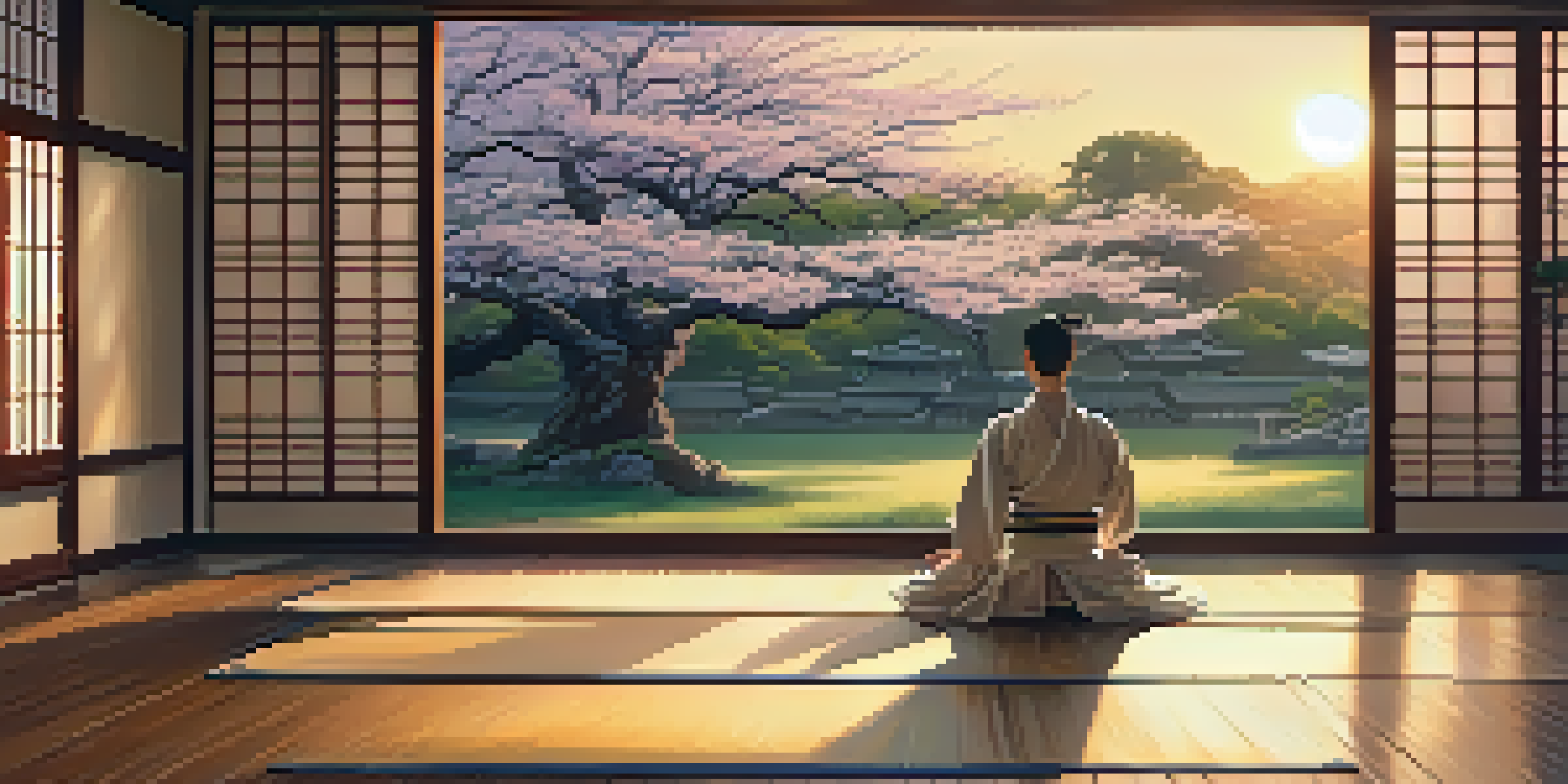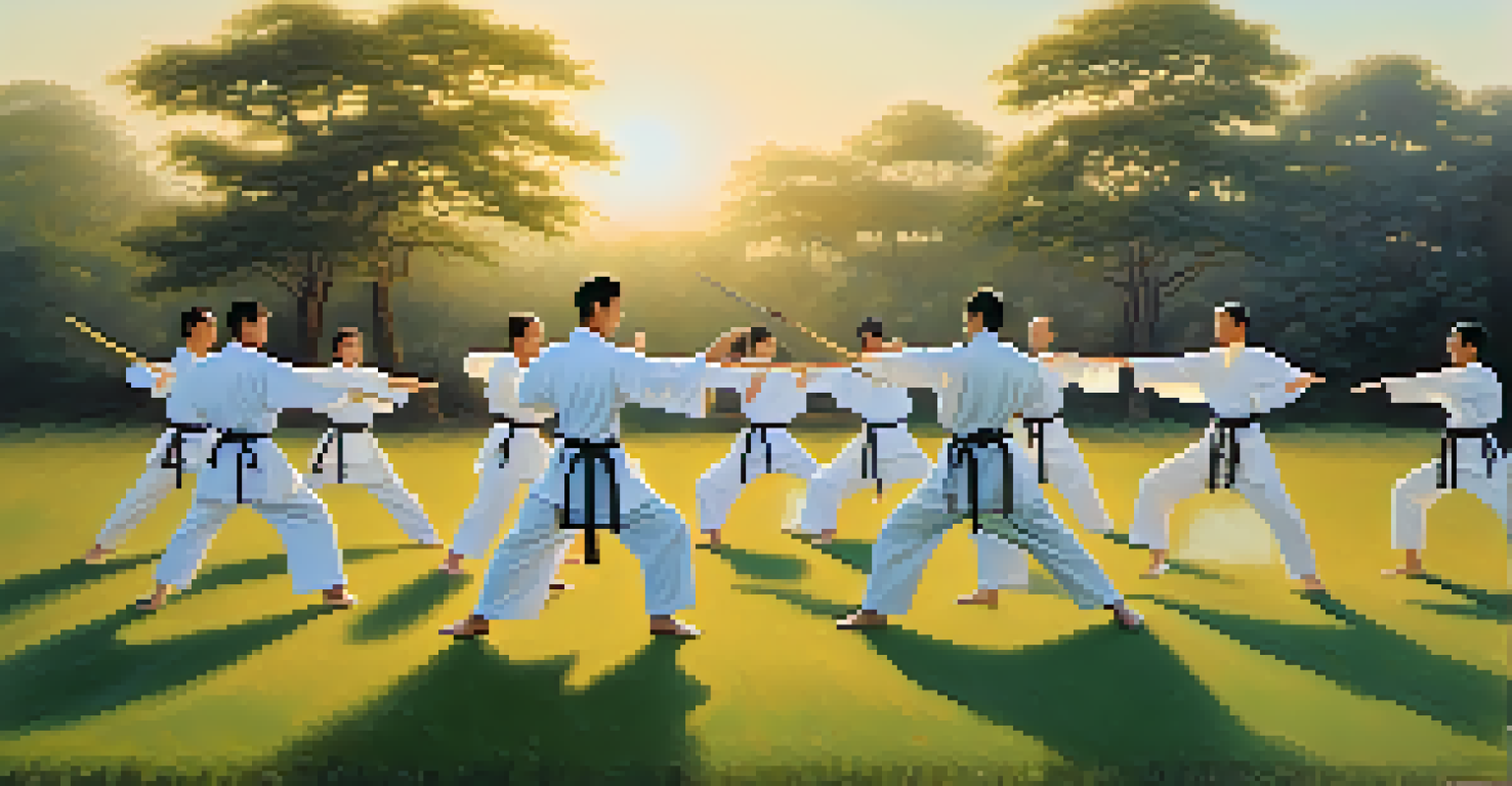Mindfulness in Martial Arts: Enhancing Conflict Resolution Skills

The Essence of Mindfulness in Martial Arts Practice
Mindfulness in martial arts goes beyond physical techniques; it encompasses a mental state of awareness and focus. Practitioners learn to be present in the moment, which can significantly enhance their performance. This heightened awareness not only improves their skills in martial arts but also fosters a deeper understanding of themselves and their surroundings.
The mind is everything. What you think you become.
By developing mindfulness, martial artists become more attuned to their emotions and reactions. This self-awareness is crucial in conflict situations, as it allows them to respond thoughtfully rather than react impulsively. In essence, mindfulness creates a space for reflection, enabling individuals to make more informed decisions during conflicts.
Moreover, mindfulness teaches practitioners to observe their thoughts without judgment. This practice can help them recognize escalating emotions during conflicts, providing an opportunity to pause and choose a more constructive response. Ultimately, mindfulness equips martial artists with the tools to navigate conflicts with grace and composure.
Developing Emotional Intelligence Through Martial Arts
Emotional intelligence, the ability to understand and manage emotions, is a vital skill that can be enhanced through martial arts. As practitioners engage in sparring or training, they learn to recognize their emotional triggers. This awareness helps them to control their reactions, making it easier to diffuse tense situations.

In martial arts, practitioners often face challenges that provoke frustration or anger. By practicing mindfulness, they can learn to channel these emotions positively, transforming potential conflicts into opportunities for growth. This transformation fosters a sense of empathy, allowing martial artists to connect with others on a deeper level.
Mindfulness Enhances Performance
Practicing mindfulness in martial arts improves focus and self-awareness, leading to better performance and understanding of oneself.
Furthermore, emotional intelligence encourages better communication skills, which are essential for resolving conflicts. By understanding their emotions and the emotions of others, martial artists can articulate their thoughts and feelings more effectively. This clarity can lead to more productive conversations and ultimately, smoother conflict resolution.
Mindfulness Techniques Used in Martial Arts Training
Various mindfulness techniques can be integrated into martial arts training, enhancing both focus and conflict resolution skills. One common practice is breath control, where practitioners learn to regulate their breathing during intense training sessions. This not only calms the mind but also improves performance under pressure.
Emotional intelligence is the ability to sense, understand, and effectively apply the power of emotions as a source of human energy, information, and influence.
Another effective technique is visualization, where martial artists imagine themselves successfully navigating a conflict or challenge. By mentally rehearsing scenarios, they can prepare for real-life situations and reduce anxiety. This proactive approach allows them to feel more confident and grounded during actual conflicts.
Additionally, meditation plays a pivotal role in cultivating mindfulness. Regular meditation practice helps martial artists develop a calm and centered mindset, making it easier to manage stress and conflict. Integrating these techniques into training not only enhances martial arts skills but also equips practitioners with valuable life skills.
Applying Mindfulness Beyond the Dojo
The benefits of mindfulness practiced in martial arts extend far beyond the dojo. Practitioners can apply these skills in everyday life, particularly in high-stress situations. Whether it’s a heated discussion at work or a disagreement with a friend, the ability to remain calm and focused can make all the difference.
For instance, someone trained in mindfulness may find it easier to listen actively during conflicts, rather than getting defensive. This active listening fosters understanding and can lead to more amicable resolutions. By modeling these behaviors, martial artists can inspire others to adopt similar approaches in their own conflict resolution.
Emotional Intelligence is Key
Martial arts training fosters emotional intelligence, helping practitioners manage their emotions and communicate effectively during conflicts.
Moreover, the discipline learned through martial arts can encourage individuals to approach challenges with a sense of resilience. Instead of avoiding conflicts, they are more likely to face them head-on with an open mind. This proactive mindset can lead to healthier relationships and improved communication skills.
Mindfulness and the Importance of Respect
Respect is a cornerstone of martial arts, and mindfulness amplifies this fundamental value. Practitioners learn to respect not only their instructors and peers but also themselves. This self-respect fosters a sense of integrity, which is essential when navigating conflicts.
By practicing mindfulness, martial artists can better appreciate different perspectives in a conflict. This respect for others' viewpoints encourages open dialogue, making it easier to find common ground. In this way, mindfulness cultivates a culture of respect, which can significantly improve conflict resolution outcomes.
Additionally, mindfulness helps practitioners to recognize the impact of their actions on others. By being aware of their behavior and its potential consequences, they can strive to approach conflicts with compassion and understanding. This respectful approach can lead to more positive interactions and healthier resolutions.
The Role of Mindfulness in Personal Growth
Mindfulness in martial arts is not solely about conflict resolution; it also plays a crucial role in personal growth. As practitioners become more aware of their thoughts and emotions, they gain insights into their strengths and weaknesses. This self-discovery is integral to becoming a better martial artist and, ultimately, a better person.
Through mindfulness, martial artists can identify patterns in their behavior that may hinder their progress. By recognizing these patterns, they can work on improving them, fostering a sense of continuous growth. This journey often leads to increased self-esteem and confidence, essential qualities for effective conflict resolution.
Skills Extend Beyond the Dojo
The mindfulness techniques learned in martial arts can be applied to everyday life, enabling better conflict resolution and healthier relationships.
Furthermore, personal growth through mindfulness encourages a mindset of lifelong learning. Practitioners are more likely to embrace challenges and view conflicts as opportunities to learn rather than obstacles. This perspective shift can transform their approach to conflicts, leading to more constructive and peaceful resolutions.
Conclusion: Embracing Mindfulness for Better Conflict Resolution
In conclusion, mindfulness in martial arts offers valuable tools for enhancing conflict resolution skills. By cultivating awareness, emotional intelligence, and respect, practitioners can navigate conflicts more effectively. The lessons learned in the dojo can positively impact various aspects of life, promoting healthier relationships and better communication.
As martial artists continue to develop their mindfulness practices, they not only improve their skills but also their ability to handle conflicts with grace. This dual benefit underscores the importance of integrating mindfulness into martial arts training. By embracing mindfulness, individuals can transform their approach to conflict, leading to more peaceful and constructive outcomes.

Ultimately, the journey of mindfulness in martial arts is about more than just fighting techniques; it’s about personal growth, respect, and the continuous pursuit of harmony. As practitioners cultivate these qualities, they become not just better martial artists but also better human beings.